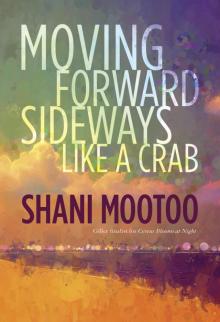- Home
- Shani Mootoo
Polar Vortex Page 2
Polar Vortex Read online
Page 2
And, Alex continued, it would not have occurred to her that I would have been involved with the man.
Alex and I hadn’t yet slept together, but the air in my little living room had become so electric I knew I wasn’t the only one with it on the brain. I found myself telling Alex that Fiona and I had met in a first-year class and decided to rent an apartment together, that within days of doing so we became lovers, my first time, her first and only — at least at that time — with a woman. We remained lovers throughout our university years, I said, the wistfulness in my voice hopefully pointing to the unforgotten sensations of first-time love.
“First time?” asked Alex.
“Every time,” I remember responding, grinning.
She twisted her lips and smiled at the same time, and said, “Come on. You must have been in your late teens, early twenties? Was she the first person?”
I was too shy to simply tell her yes, Fiona was indeed the first. I quickly explained that when I was growing up on my little island in the Caribbean, women from families like mine remained girls in their family’s care until they were married, regardless of their age. You were so sheltered, so watched in my kind of family — an Indian family — that unless you were wayward or just stupidly brave, you didn’t get to flirt or experience sexual intimacy with another person until you were married, or, if it was in the cards for you, you left home and went to another country where, in the case of people from families like mine, you attended university — which allowed you more freedom than you’d ever imagined possible. And what do you do with freedom like that? You learn to kiss and you learn to fuck. You learn what’s possible, you experiment, and you figure out in the dorms or in your little bachelor apartment off campus what you like to do and to whom, and what you like to have done to you, and by whom, who you are in bed, who you can and can’t be. All of that, a vital part of your university education abroad. I laughed coyly when I said this. She didn’t think it funny. She nodded soberly. When you went back home, I continued, you went back a different person, with more than one degree under your belt. Still, she wasn’t amused. If you weren’t so stupid as to marry while you were away, despite the paper degree you had to show off when you returned home, they’d still call you a girl, and you wouldn’t be considered a woman until you married — but what a girl you’d become! She smiled.
So, yes, first time, first person. And it was magic — frighteningly magical, I repeated in a quiet, pensive voice. Alex had angled her body slightly to face me. “You?” I asked.
“Elementary school, in Montreal.” The throw pillow was definitely an intrusion. “There was a girl, from a very rich and powerful family. She instructed us to touch her and each other. I think about that now,” Alex told me, “and I have to wonder how she knew.”
I feigned a nervous chuckle and said, “But you don’t really count that, do you?”
“So the real first time, then,” she answered, “was when I was fifteen. A boy, my age, from my high school. We did it on a couch in the basement of his parents’ home.”
There we were on a couch, and I stopped myself from the tempting crudeness of drawing a parallel. Alex examined the photograph more carefully, and I imagined she was trying to picture Fiona and me, our mouths pressed together, tongues touching, the heat of our bodies against one another. As I was whipping up something between Alex and me, I was aware that we were being stared at by a broadly grinning Prakash waving his weak V-shaped fingers. I decided not to mention anything about him, but elaborated that it was with Fiona I’d experienced that first-time sensation of ascending, ascending, and ascending yet further, and then, that sudden dive-bombing feeling, your body shattering into a trillion shards of twinkling, long-dying light.
In a whisper, Alex asked if I’d remained friends with Fiona, or with any of the other team members, and although I didn’t want to get into a conversation about Prakash, I said, “Him,” landing my forefinger on his face, and, for some reason, unable to leave it at that, as if it were the most important thing about him, I answered that he was our friend, a refugee from Idi Amin’s Uganda.
“You’re still friends? What’s his name?” she asked.
“Sort of. Prakash,” I said, and she left it there.
I didn’t tell her that in the last months of our university years, Fiona had begun to have an affair. With a man. A student named Stan. Had I embarked on this story, I might have told her then that it was the man in the photo who’d helped me through that wretched period and many others, but I did not want to derail the moment with tales of woe and disappointments.
· · ·
* * *
Yes, Fiona, Prakash, and me, this odd threesome, as he liked to joke about us. We were, for a while, a team. But despite what she and I thought of as a definable intensity in our closeness, he seemed oblivious, and there was never a reason to explicitly explain ourselves. When the relationship ended because of her involvement with Stan, Fiona spent very little time in our apartment. Those were dark days for me, days I felt I could die. The phone would ring, and I’d listen as a message was being left on the answering machine, hoping it was Fiona. But, broken-hearted and desolate if it was anyone else, including Prakash, I couldn’t bring myself to pick up the phone.
One afternoon, an insistent knocking on the door tore me from sleep. “I know you’re in there. Please open, Priya,” he pleaded. He wouldn’t leave. I had no choice but to let him in. He leaned against the shut door and looked at me still in my pyjamas. “What’s happening to you?” he asked, his brows creased with concern. “I phoned yesterday from the booth outside. I could see you moving about, but you wouldn’t pick up the phone. Were you sleeping? Are you ill?” He bypassed me and walked to the kitchen, where he put the kettle on. He stayed until late into the evening, me lying on the couch as if I had the flu, my feet in his lap, neither of us speaking much. He ordered a pizza over the phone and had it delivered. I nibbled the pointed end of a single wedge, more to satisfy him than any hunger. To get him to leave, I had to promise that I’d eat more of the remaining pizza, and that I’d get up the following morning and attend classes, which I’d been missing.
He knew by then that Fiona was spending time elsewhere, but since nothing more had ever been explained to him, he put down my sudden depression to a natural kind of loneliness, to not having family nearby, or a good substitute for family, which he said Fiona had once been to me. It was he, then, who, more than a few times, came around and comforted me as I cried, he who encouraged me to get out of bed and out of the apartment. He who came and prepared meals for me and tried to get me to eat. It was as if he had decided to be the family he thought I needed. He seemed to want nothing in return, and I began to look forward to his visits. Throughout this time I never even hinted to him about Fiona and me.
· · ·
* * *
I’m certain it wouldn’t have been wise to have told Alex during these last days that yes, he had at one time, but only briefly, been interested. She knows little about the years that immediately followed my emigration to Canada once my university tenure had been completed. There’s just never been any reason to get into the details with her of those early days in this country.
I’d found lodging in city-subsidized housing in Toronto. Prakash and I had not lost touch but we weren’t as close as before. I had embarked on a practice of artmaking as diligently as anyone pursuing any other kind of career but was, of course, making no money at it, always running out of paint and canvas, and often couldn’t pay the bills. My kitchen cupboards tended to be empty, save for cans of ravioli and packages of ramen. Prakash arrived at my apartment one day, unannounced, just after I’d hung up from a phone call with a family member back home who responded to my appeals for financial help — perhaps one too many — advising that I get an ordinary job like normal people, or return at once and marry a man who could take care of me while I pursued my “hobby,” as they called it.
&n
bsp; Seeing the state I was in, Prakash held my face in his hands and whispered earnestly, “Your greatness as an artist is being heralded in this very moment. Others can’t see it, but I can. Do you trust me? Let me help you. We can do this together.” I was curious, and my protests were weak, and he easily brushed them away as he carried on with his mission. He tore a sheet of paper from the drawing pad on my dining table, pulled a pen from his shirt pocket, and, handing it to me, directed me to itemize the sums of my rent, utilities, groceries, paints, canvas, and everything else I needed to see me through a month’s living. Then he asked me to write down my income. I drew an egg and, while I shaded it in, crosshatching with his blue ink pen, he went to one of the several stacks of paintings leaning against a wall and flipped through it. He pulled out a small canvas board on which I’d made a study in oil of two green glass bottles and a clear one on a tabletop in front of a window through which blue skies topped an emerald-green field. He didn’t ask, but announced he was taking it in exchange for the sum of that month’s needs, which, he said, would one day — probably after I’d died, he added, laughing — be seen to have been a bargain. That was the first painting I ever sold, and I made it through that month.
After that, I sort of fell, little by little, into him for comfort and support. Yes, there were moments over the course of our continuing friendship he acted as if I were his girlfriend, and although I didn’t exactly push him away, I didn’t cave either. If I’d long ago told Alex any of this, surely she’d have understood the predicament I had often found myself in as an artist trying to make a go of it on so many fronts and all on my own. Surely she’d have sympathized and seen that I couldn’t, after all, have made it in this country entirely alone. Or perhaps she’d have seen something more sinister.
The point is, I hadn’t let her in on any of this, and to do so now would be nothing short of foolish.
· · ·
* * *
It’s true, there were times I did feel something for him — love, you could say. But this word love, it is a lightning rod that seems, especially in this instance, to have only one meaning. It is so much less nuanced than it should be. I did love him, how could I not have? It is true he had stronger feelings toward me, but mine for him were only ever sisterly.
Well, I suppose one could say my actions were not always sisterly. In a situation such as he and I were in, both for the first time in our lives away from home and trying to make it on our own, it surely isn’t unreasonable that I would have wondered whether or not my feelings for him were this romantic love I could see he felt for me. There were times, naturally, I had to try and see. For me those times were clarifying, but I guess for him they were confusing.
Alex tells people it was my confidence, my unwavering sense of self, that attracted her to me. In the early days I’d tell her it was nothing but well-practised posturing. Calm on the surface but paddling like hell beneath, I’d say, laughing. But she’d think I was being modest and this, too, she found attractive. And today, if I reveal that this man was so very much a part of my life, what would she think? Discretions and half-truths were par for the course in those early days when she and I were courting each other. But how would they be perceived now?
With her I indulged in the fantasy of having always been fierce enough to stand firm against the norms of society and expectations of family. She liked this. And so I went along with the uncontested assumption that I’d never actually been interested in being with a man. I can’t, therefore, admit to her there were times I played the Indian woman to Prakash’s Indian man.
If I did reveal any of this to Alex, it would never be the same between us. I can’t risk that. We’ve built a comfortable life together. I don’t want to up-end it.
But I’m risking something, aren’t I, by hosting him here?
· · ·
* * *
The dream was just that: a dream. In waking hours I haven’t had that kind of desire for him. Not for a long time, anyway. And now, this past night, messing with my head, my body.
Okay, I guess I’m really awake. I should get up.
But it’s cold. And there’s enough time before he comes. I don’t really have to hurry just yet.
· · ·
* * *
That night on the sofa, when Alex first saw the photo of Fiona and Prakash and me, I told her I’d been on a student visa, and when the term ended, I had to return home — but having experienced that kind of love and the physical expression of it, not permitted back there on that Caribbean island, in my family’s home, I knew I could not stay. When, a year later, I emigrated to Canada, the man in the photo and I reconnected; he, a more practical type than I, became a guiding light as I tried to figure out how to live on my own, how to survive on the income from temporary, low-paying jobs while I amassed a portfolio of paintings in the hope of carving out a niche for myself in the city’s art scene. I did not add that, yes, he had continued to hope for more than friendship, and that every so often I had to remind him that anything more than platonic was unlikely between us.
Staring at him in the photo, I felt like a traitor downplaying to Alex his presence in my life, and I believe this made me careless — and my mouth runneth over. I found myself adding a thing or two more, albeit in a self-deprecating tone, as if it were slightly funny and preposterous: he used to be “sort of interested” in me, but I set him straight. We used to be in touch occasionally, I told her, but it had been a while since I’d heard from him. Discretions and half-truths, pirouetting on a dime even as I feared my caginess was much too apparent. But Alex didn’t seem to notice.
· · ·
* * *
People have long and complicated lives, and it behooves every one of us to understand and accept that the older we are when we meet our life partner, the more likely that each of us will be dragging baggage, and that we’ve only been able to grow into the person we became because of that baggage — by having fucked up and learned, fucked up and learned, again and again, and the graver the mistakes we made and the heavier the loads we carried, the bigger the leaps we would have been forced to perform, and it was those very leaps that made us today into better, stronger, more resilient people. Therefore, to go announcing one’s mistakes long after they’d been made and lessons had been learned is counterproductive to the ongoing project of creating a better or grander person out of oneself.
Alex wasn’t at all curious about the man standing on the other side of me. She shifted her body on the couch, a little movement that caused her to lean ever so slightly against me. It took my breath away — the feel of her, the communication of desire in such a slight rearrangement. She drew the throw pillow out from between us. Elliot, as if he knew, rose up, did his little yoga dog pose, and let himself down off the couch.
* * *
Recalling what followed the dance of Alex’s shift and pillow removal — and Elliot’s theatrical approval — waves of new desire arouse me again. I’d very much like to remain here under the bedsheets and relive that first time with Alex.
But instead, images, unsolicited, of Prakash inside the red canopy, the low bed, the red petals, flood my mind. My heart races, but only with fear.
What oh what on earth was I thinking? Why did I ask him here?
· · ·
* * *
The day I told Alex that Prakash would be coming to spend a night with us in our house, she was perplexed. She hadn’t realized, she said, that the man in the photo and I had all the while been communicating. We hadn’t, I told her. Just after I opened my Twitter account, he saw I was active on it and wrote me. She was instantly incensed. “You expect me to be happy that a strange man will come and spend a night here with us?”
I was taken aback, of course, and protested, perhaps too much, which then set the tone for all interactions between her and me regarding him. “What do you mean? He’s one of my oldest friends,” I said, then corrected myself: “Not one of. He is my oldes
t friend. I’ve known him longer than anyone else in this country. Longer than anyone I’m still in touch with.”
She lobbed back, “Maybe so, but you never talk about him. As far as I can tell, he’s not part of your life. And he is a stranger to me. He can stay at a bed and breakfast. You can find one for him.”
“Oh, come on. He was once one of my closest friends; when he asked, I couldn’t say no. We really were very close. I didn’t want to say no. In any case, it’s only for one night.”
“And what do you mean by that — really very close?”
“Oh, good God. As close as a lesbian and a straight man could be.” I rolled my eyes and laughed. I looked to the ceiling, then added dramatically, “Don’t be ridiculous.”
“You should’ve asked me first, Priya,” she said.
The truth is, when I invited him it was an impulsive gesture and I didn’t expect he’d come all the way down here. When he accepted, I was taken aback. I recognized at once that I’d gotten on a train that was travelling at breakneck speed and I found myself unable to uninvite him.

 Cereus Blooms at Night
Cereus Blooms at Night Polar Vortex
Polar Vortex He Drown She in the Sea
He Drown She in the Sea Valmiki's Daughter
Valmiki's Daughter Moving Forward Sideways Like a Crab
Moving Forward Sideways Like a Crab